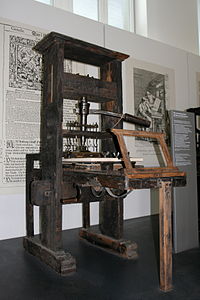 |
The printing press is a mechanical printing device for making copies of identical text on multiple sheets of paper. It was invented in Germany by the engraver Johann Gutenberg in 1450. Printing methods based on Gutenberg's printing press spread rapidly throughout first Europe and then the rest of the world, replacing most block printing and making it the sole progenitor of modern movable type printing. The printing press's ability to quickly and uniformly disseminate knowledge aided in the propagation of Luther's Ninety-Five Theses and other works of the Protestant Reformation, the European rediscovery of the Greek and Roman Classics that helped instigate the Renaissance, the decline of Latin and the ascent of the various vernaculars, and the development of scientific journals and their specialist vocabulary, or jargon. The level of importance of the printing press is rivaled by few other inventions, so much so that "the invention of the printing press" is often used as a reference to the social, political, and scientific change experienced by Europe after the press's introduction. |